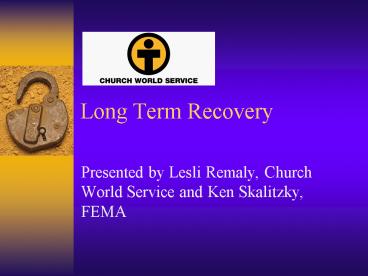Long Term Recovery PowerPoint PPT Presentation
1 / 22
Title: Long Term Recovery
1
Long Term Recovery
- Presented by Lesli Remaly, Church World Service
and Ken Skalitzky, FEMA
2
Phases of a Disaster
Preparedness
Mitigation
Incident
DISASTER CYCLE
Recovery
Response
FEMA Course IS288 Role of Voluntary Agencies in
Emergency Management
3
Definition - Unmet need
- Basic life-sustaining need for which there is not
an immediately accessible resource. - A disaster caused unmet need is something the
survivors cannot provide for themselves, (not to
be confused with pre-existing conditions and
ongoing social issues). - May be loss of life, injury, income, housing,
vehicle or household goods and may be caused by
stress. - Should be identified by the survivor, verified by
casework and agreed on by the recovery group.
4
Falling through the Cracks
- Being a survivor of a Non-Declared Disaster
- Failing to call the Teleregistration number
- Having inappropriate Insurance
- Failing to understand your rights
- Failing to fill out and return SBA packet
- Failing to understand the reconsideration and
appeal process - Being ineligible for assistance
- Having needs in excess of assistance
- Needing help with labor
5
Vulnerable Populations
- Older persons, and children
- Those with physical and mental disabilities
- Cultural and ethnic minorities
- Persons with language or literacy barriers
- Those who are economically vulnerable because of
employment, legal/citizenship status, and
education
6
Case Management
- Screening clients
- Home Visit Interviewing
- Verifying information
- Identifying Survivor participation
- Presenting the unmet needs
- Providing assistance
- Following-up and closing the case
7
Current IHP Implementation
Client calls Teleregistration Number
Inspector visits disaster site and makes a
determination
8
- Determined to be safe
- 0 IHP Housing
- up to 200,000 SBA Loan
- If qualified
9
- Determined unsafe/destroyed
- uninsured or underinsured,
- up to 200,000 SBA Loan If qualified
- SBA Denial If Owner meets criteria, might
qualify for maximum of 10,000 under home
replacement program.
10
- Determined to be unsafe,
- but economically feasible to repair,
- Maximum allowed 5,100 (even if the value of
needed repairs is above that amount) - up to 200,000 SBA Loan If qualified
11
Organizing Recovery
- Long Term Recovery Organizations (LTRO)
- An organization, operating independently or under
the auspices of another agency - works to address the needs of the community and
individuals following a disaster. - May be community based, faith-based or a
collaboration.
12
Voluntary Organizations Active in Disaster (VOAD)
- Cooperation, Coordination, Communication,
Collaboration - Recognizes the agencies provides the direct
disaster services. - Plans, and coordinates primary resources of its
members during disasters. - Trains members for effective activity in all
phases of disaster response and recovery. - Supports and promotes the establishment of a long
term recovery process - Convenes members to share information concerning
the disaster and their plans for response. - Partners with government emergency management
agencies to facilitate communication and
coordination.
13
Partners During Long Term Recovery
- State Emergency Management and its Voluntary
Agency Liaison - Federal Emergency Management Agency and its
Voluntary Agency Liaison (VAL) - American Red Cross and its Liaison to Voluntary
Agency (LVA) the Additional Assistance
Program - Church World Service Emergency Response
Program and its Disaster Response and Recovery
Liaison (DRRL) - Other Governmental and Non-governmental Agencies
- VOADS
- Local Communities
14
Long Term Recovery
15
- What are the indicators that a LTRO/LTRC/Interfait
hs should be formed?
16
Organizing
- Claim Responsibility
- Develop a purpose or mission statement
- Do a needs assessment
- Secure Confidentiality Agreement from Members
- Develop and support a case work plan
- Criteria for assistance
- Case by case
17
Organizing continued.
- Designate leadership
- Chair
- Secretary
- Board
- Develop an operational process
- Case presentation
- Record keeping minutes of meetings, etc
- Grievance Process
- Evaluation
- Close or transition to preparedness and mitigation
18
Why Bother???
- Why have another committee or organization?
- Why not just do business as usual and broker
through normal channels? - Why not just let existing agencies handle it?
19
Advantages For Survivors
- Access to the agencies simultaneously
- Benefit of collective creative problem solving
skills of many experienced case managers - Benefit of quick decision making and commitments
from agencies providing services and resources
20
Advantages for Agencies
- Expands opportunity of each agency to assist
survivors - Makes possible the best and most extensive use of
resources - Avoids duplication of benefits
- Opens cases of each agency to full range of
resources - Provides a system for future interaction
- Allows the agencies to return to normal operations
21
Goal
- Recovery!
helping to identify unmet needs developing a
recovery plan verifying the needs resourcing and
coordinating assets Heal lives communities
22
EMERGENCY RESPONSE PROGRAM Suite 700 475
Riverside Drive New York NY 10115 www.cwserp.org
www.churchworldservice.org Lremaly_at_churchworldser
vice.org 305-972-5568

